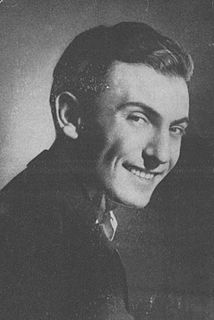
Edwin Frank Duchin, commonly known as Eddy Duchin or alternatively Eddie Duchin, was an American jazz pianist and bandleader during the 1930s and 1940s.

Carmen Dragon was an American conductor, composer, and arranger who in addition to live performances and recording, worked in radio, film, and television.

Carmen Cavallaro was an American pianist. He established himself as one of the most accomplished and admired light music pianists of his generation.

Ary de Resende Barroso (1903–1964), better known as Ary Barroso, was a Brazilian composer, pianist, soccer commentator, and talent-show host on radio and TV. He was one of Brazil's most successful songwriters in the first half of the 20th century. Barroso also composed many songs for Carmen Miranda during her career.

The Eddy Duchin Story is a 1956 Technicolor film biopic of band leader and pianist Eddy Duchin. It was directed by George Sidney, written by Samuel A. Taylor, and starred Tyrone Power and Kim Novak. Harry Stradling received an Academy Award nomination for his cinematography in the CinemaScope film. The film received four nominations in total and was one of the highest-grossing films of 1956. Incorporating signature elements of Duchin's style into his own original style, Carmen Cavallaro performed the piano music for the film.
"Three Little Words" is a popular song with music by Harry Ruby and lyrics by Bert Kalmar, published in 1930.

John Waldo Green was an American songwriter, composer, musical arranger, conductor and pianist. He was given the nickname "Beulah" by colleague Conrad Salinger. His most famous song was one of his earliest, "Body and Soul" from the revue Three's a Crowd. Green won four Academy Awards for his film scores and a fifth for producing a short musical film, and he was inducted into the Songwriters Hall of Fame in 1972. He was also honored with a star on the Hollywood Walk of Fame.
"Stars Fell on Alabama" is a 1934 jazz standard composed by Frank Perkins with lyrics by Mitchell Parish.
Peter Oelrichs Duchin is an American pianist and band leader.
"I Only Have Eyes for You" is a romantic love song by composer Harry Warren and lyricist Al Dubin, written for the film Dames (1934) when Dick Powell introduced it. Several successful recordings of the song were made in 1934; later, there were charted versions by The Flamingos (1959) and Art Garfunkel (1975).
"Pennies from Heaven" is a 1936 American popular song with music by Arthur Johnston and lyrics by Johnny Burke. It was introduced by Bing Crosby with Georgie Stoll and his Orchestra in the 1936 film of the same name.
Leo F. Reisman was an American violinist and bandleader in the 1920s and 1930s. Born and reared in Boston, Massachusetts, United States, he was of Jewish ancestry; from German immigrants who immigrated to the United States in the 19th century. Inspired by the Russian-American violinist Jascha Heifetz, Reisman studied violin as a young man. After being rejected by the Boston Symphony Orchestra, he formed his own band in 1919. He became famous for having over 80 hits on the popular charts during his career. Jerome Kern called Reisman's orchestra "The String Quartet of Dance Bands".
"How Deep Is the Ocean?" is a popular song written by Irving Berlin in 1932. The song was developed from an earlier Berlin song "To My Mammy" which was sung by Al Jolson in his film Mammy (1930). In the earlier song, the lyrics include the questions "How deep is the ocean? / How high is the sky?" and this was the genesis of "How Deep Is the Ocean?".
"Snuggled on Your Shoulder " is a popular song with music by Carmen Lombardo and lyrics by Joe Young, published in 1932.
Jimmy Maxwell is a musician and band leader who has performed and conducted from coast to coast in the United States. Jimmy has been the band for top social functions in New Orleans since 1981. From 1985 to 1989, Jimmy was partners with Peter Duchin, the famed society band leader from New York City and together they produced events involving sound, lighting, staging and even decor.

George Greeley was an Italian-American pianist, conductor, composer, arranger, recording artist and record producer who is known for his extensive work across the spectrum of the entertainment industry. Starting as an arranger and pianist with several notable big bands in the 1940s, he segued into the Hollywood radio scene, working on several nationally broadcast variety programs. After conducting an Army Air Force Band during World War II, he was hired by Columbia Pictures as a staff pianist and orchestrator. He worked as pianist on several hundred motion pictures, worked with many famous composers orchestrating their soundtrack compositions, and created original compositions of his own in several dozen movies. It was Greeley's hands that performed the piano parts that Tyrone Power mimed in The Eddy Duchin Story. Concurrent with his work at Columbia Pictures, George Greeley also worked at Capitol Records as music director, pianist, and conductor for many artists such as Gordon MacRae, Jane Powell, Jo Stafford, Frankie Laine, and Doris Day. He was hired in the late 1950s by the newly established Warner Brothers Records. George Greeley arranged, orchestrated and performed as primary artist for a series of hit recordings entitled "Popular Piano Concertos." As music tastes changed in the late 1960s, Greeley had already moved into television, composing themes and music for popular TV series like My Favorite Martian,The Ghost and Mrs. Muir,Nanny and the Professor, and Small Wonder. He performed as featured piano soloist and as guest conductor in concert appearances around the world. He died from emphysema at age 89 in Los Angeles, California.
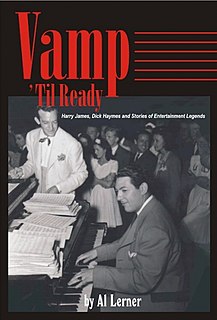
Al Lerner was an American pianist, composer, arranger, and conductor from the big band era. He was a member of the Harry James band for many years, playing piano. He wrote music for several artists, including Allan Sherman and Liza Minnelli. He also wrote the music for "So Until I See You", the closing theme for The Tonight Show with Jack Paar in the early 1960s, and was the pianist for A Tribute to Eddie Duchin, which was a soundtrack for the 1956 biographical film pic The Eddy Duchin Story.
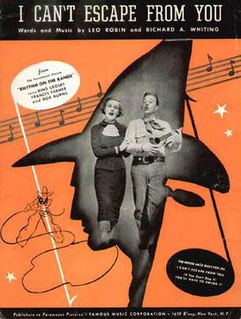
"I Can't Escape from You" is a song written music by Richard A. Whiting and lyrics by Leo Robin for the 1936 Paramount Film "Rhythm on the Range", and first introduced in the film when Bing Crosby sang it to Frances Farmer. Crosby recorded it for Decca Records that same year with the Jimmy Dorsey Orchestra and it was in the hit parade for 11 weeks reaching a peak position of No. 7. Crosby recorded the song again in 1954 for his album Bing: A Musical Autobiography.
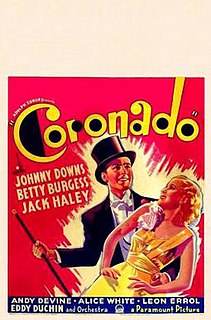
Coronado is a 1935 American comedy film directed by Norman Z. McLeod and written by Don Hartman and Frank Butler. The film stars Johnny Downs Betty Burgess, Jack Haley, Andy Devine, Leon Errol, Alice White and Eddy Duchin. The film was released on November 29, 1935, by Paramount Pictures.
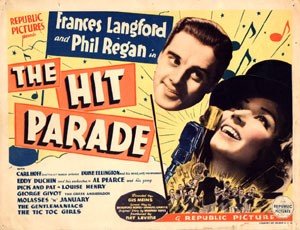
The Hit Parade is a 1937 American musical film directed by Gus Meins and written by Bradford Ropes, Samuel Ornitz and Harry Ruskin. The film stars Frances Langford, Phil Regan, Max Terhune, Edward Brophy, Louise Henry and Pert Kelton. The film was released on April 26, 1937, by Republic Pictures. Republic later reissued the film in 67 minute length as I'll Reach for a Star.










